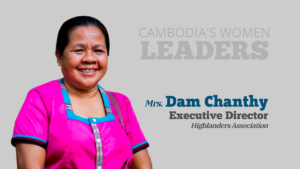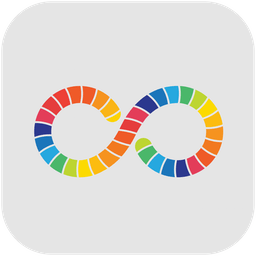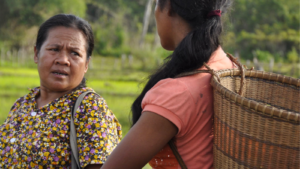
This is a single part of a series of stories of 21 women leaders of Cambodia. Download the full publication here.
Give a short introduction about your life (family, education, marital status) and how has your experience been as a leader and what achievements are you most proud of?
My name is Dam Chanthy. I was born in September 1955 in the Taumpaun indigenous group of Talao Commune, Andong Meas District, Ratanakiri Province. I married Mr. Loung Sothea, and we had six children together. I was raised in a poor agricultural family that depended mainly on traditional rice planting and wild vegetables. When I was small, I was sold to be a domestic worker in a rich family. During the Khmer Rouge regime, I was assigned to be a medical worker in region 101. From 1979 to 1995, I was a member of a women’s association. In March 1996, I was selected as a translator for an NTFP (Non-Timber Forest Products) organization, and later, for other projects that focused on gender and health. In 2000, I established the Highlander Association (HA). I have continued my leadership journey because it has always been my dream ever since I was young. More recently, I have been active in leading communities to claim their rights and have received extensive support from indigenous communities, my beloved colleagues, and the international community. Between 2003 and 2005, during a time of massive land grabbing issues, I ran educational campaigns for Indigenous People (IP) in 18 communes, to encourage them not to sell their land to outsiders. Thanks to our campaign and to support from King Norodom Sihanouk and Prime Minister Hun Sen, we reclaimed the land for the Veat Kloe and Chhroung Communities through his Excellency Noun Phea.
Female business owners should share more of their experiences and skills with women in rural areas.
When you first started out in your career, what were your most significant challenges?
I have faced many challenges in the leadership positions I have held. I have faced difficulties with resource mobilization and also with communication in English in order to support the mission of the organizations. I did not know many development partners or donors. Most importantly, I was not able to write proposals and or write fund raising reports. In addition, I have received death threats from anonymous people because of my land campaigns with IP communities. For ex-ample, I received a threat to my life in public in 2016. Our Highlander Association was recently threatened with closure because of our campaigns with IP communities. However, I am trying hard to promote and protect IP land rights and natural resources. Significantly, I have worked with IP women on economic empowerment programs.
Over the years, what valuable lessons have you learned as a leader?
- I have had good life experiences as an IP leader. The most valuable lessons have been:
To trust my teams, donors and the IP communities who have engaged in our IP land rights promotion. - It is of good value to be transparent when leading organizations. I am so proud that my organization can adapt and follow the requirements of both local donors and international development partners even though we are an IP led organization.
- Strong support from my board of directors and my team are my main drivers in leading on IP land rights.
What are your core values and how do you ensure your team is aligned with your values?
I believe in acting with transparency and accountability in order to ensure that the interests and rights of indigenous communities are respected. To achieve this, I and my colleagues always aim for:
- Respect. As human beings, we are born with dignity. We have to respect each other, regardless of identity, culture, or gender.
- Passion for gender equality. In everything that we do, we have to ensure participation of both genders in community development activities and we have to promote gender equality through job opportunities.
- Commitment to building resilient IP communities. I have a robust commitment to assist IP youth and IP women with their land rights.
- Perseverance. I will never give up my dream of being a community leader. Even though I have received death threats many times, I am still working and still exerting influence for the benefit of my IP communities.
What are some of the behaviors or traits that you think can negatively impact leadership?
Traits that are not desirable in a leader are:
- Lack of understanding of the people and mission of the organization or of their team.
- Lack of team spirit or abuse of their powers with their subordinates or team without consulting the board of directors or other relevant parties.
- Lack of goals or direction for their team. Poor communication of strategy to the team.
- Lack of transparency. Leaders have to be fair and transparent with their team. Lack of transparency can result in a lack of trust.
- Ego. Good leaders need to listen carefully and accept what is right and what is wrong. In order to be a true visionary leader, we need to let go of our ego and focus on our people because without them we would be nowhere.
What are you doing to continue to excel as a leader (leadership tips in doing business and promoting women’s economic empowerment or gender equality)?
To advance my leadership capabilities, I have to strengthen myself and my teams to work in a transparent manner and be honest with the organizations, donors and IP communities with which we work. I will provide opportunities for and encourage my IP women and youth to make their own decisions. They will be given capacity building programs in leadership and community development. I will empower my internal teams. I will delegate power and the important tasks in the exploration of IP land rights and in policy dialogues with different stakeholders, both within the country and abroad. I tell myself all the time, I have to be a social servant for my communities and keep learning from others in order to develop my skills and my people. I will keep using my critical thinking in order to be calm enough to handle hazardous challenges.
What are some of the biggest risks you’ve taken in your career and how did they turn out?
Some of the risks I have faced include:
- Accusations of being politically involved in an opposition party.
- New laws and regulations, for instance, an NGO law that affects the daily operation of my organization.
- Intimidation because of my engagement with IP communities in relation to big land concessions and other economic land concessions.
- The threat of closure of my organization
Together with my teams, we come up with ways of mitigating the above risks:
- I have built a good network and work closely with NGO Forum and UNHCR. When there is a threat to my life, I can be moved out of the country for a short period of time.
- I have met with leaders of the relevant political parties, line ministries and provinces about the missions of Highlander Association in order to reduce tension and confusion.
- I have shared my knowledge and experience of working with IP communities with local and national governments.
- I strictly follow government rules and regulations and always consult my board of directors and development partners before engaging the government. We also celebrate International Women’s Rights day, IP day, and other national events with the government.
What makes Cambodian culture unique and how do you think Cambodia can thrive in this age of entrepreneurship & dynamic leadership?
Cambodia’s constitution recognizes diverse cultures and has national policies that motivate women’s leadership in both the private and the public sectors. The government has specific quotas for women political leaders in both local and national government, such as women village chiefs, women governors, women ministers, and so on. The government has established the Ministry of Women’s Affairs, which has a vital role to play in promoting women’s leadership in communities, companies, and the government sector and in formulating gender sensitive policies and budgeting. On the NGO side, we have developed many initiatives to promote women in leadership positions and to advocate for placing and promoting gender equality and equity. Every year, on the 8th of March, we all celebrate our achievements by organizing “International Women’s Rights Day”.
What advice do you have for young Cambodian female entrepreneurs?
I have a few recommendations for women entrepreneurs. They should manage their businesses by promoting more women to leadership positions without any discrimination, in particular to women from rural areas. They should provide more opportunities for and tolerate IP women and youths. I would request that female business owners share more of their experience and skills with rural and poor women. I would also like to see strong intervention from government to shut down KTV and human trafficking across borders. Finally, it is my wish to see more women in government and civil society who can help other women in rural areas like mine.
© Copyright 2019
This is a joint publication by Woomentum and Konrad Adenauer Stiftung. Download the full publication here.

